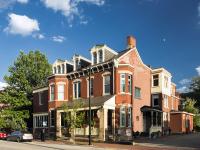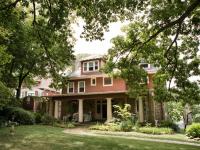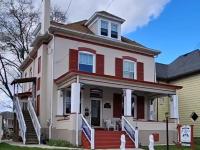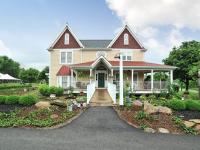You are here
Pittsburgh: From "Steel City" to City of Gardens
While perhaps not attaining the acclaim of a wonder of the world à la Babylon’s Hanging Gardens, Pittsburgh’s Garden Trail is indisputably a wonder in the region. Pittsburgh’s reputation as “the Steel City” may well be replaced by another moniker, as the urban landscape now encompasses a constellation of gardens, each of which exhibits its own specialties of floral, fauna, and architectural forms.
The 15-acre Phipps Conservatory and Botanical Gardens has been a haven in the city since 1893. Visitors will have much to see on a trip to this garden, between the extensive glasshouse and nearly two dozen discrete gardens. In addition to flower shows, famed orchid and bonsai collections, and award-winning sustainable architecture, visitors can take advantage of a special exhibit this season: “Monet in Bloom” pays tribute to many of Claude Monet’s most famous paintings, recreating the scenes portrayed in all their vividness and texture.
At Rodef Shalom Biblical Botanical Garden, culture and agriculture combine in a unique historical display of ancient topography and plants. Specimens valued by the ancient Israelites, from herbs to wheat to olives to cedar trees, are planted amidst a waterfall, desert, and a representation of the Jordan River. Please note that the garden is closed on Friday and Saturday.
Chatham College Arboretum, located on Chatham University’s Shadyside Campus, is designated a member of the American Public Garden Association. Its 32-acre site displays over 115 species of trees, stimulating both the interest of the horticulturalist and the meditations of the spiritualist.
The Mellon Park Walled Garden was originally part of the Mellon Estate, which was built in the 1920s. It has survived both the demolition of the Mellon Mansion and the demise of one of its most devoted patrons, Ann Katharine Seamans. Now the park hosts live jazz concerts by day and an ethereal, star-studded memorial to Ann by night, honoring the moment of her birth through an original exhibit created by artist Janet Zweig.
From Slavery to Freedom Garden is a unique collaboration of the Heinz History Center and Pittsburgh Parks Conservancy to showcase the plants used for food and medicine by the African American diaspora, either as free people or in the process of escaping slavery. This garden attempts to further one’s understanding of the impacts of slavery on American economics and politics.
The 62-acre Pittsburgh Botanic Garden showcases beautifully restored land that was once used for mining and logging. It now hosts a menagerie of plant-centric attractions, including special gardens allowing for interactive experiences (highlighting the five senses as they pertain to explorations of nature as well as historical experiences inspired by the early settlers), woodlands displaying plants from Pennsylvanian, European, and Asian climes, and exhibits featuring local and international artists.
Book your stay at a nearby Bed & Breakfast.




